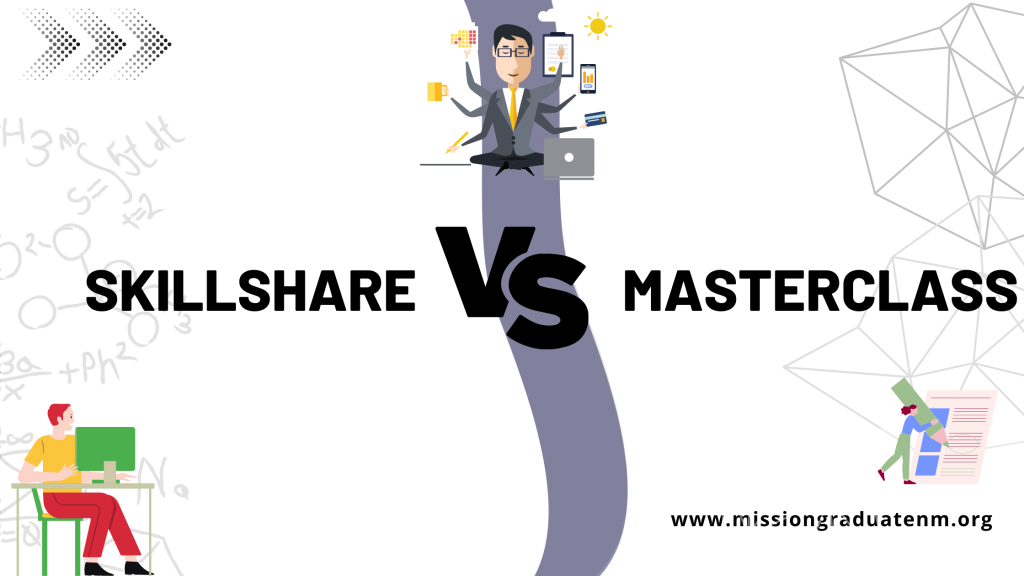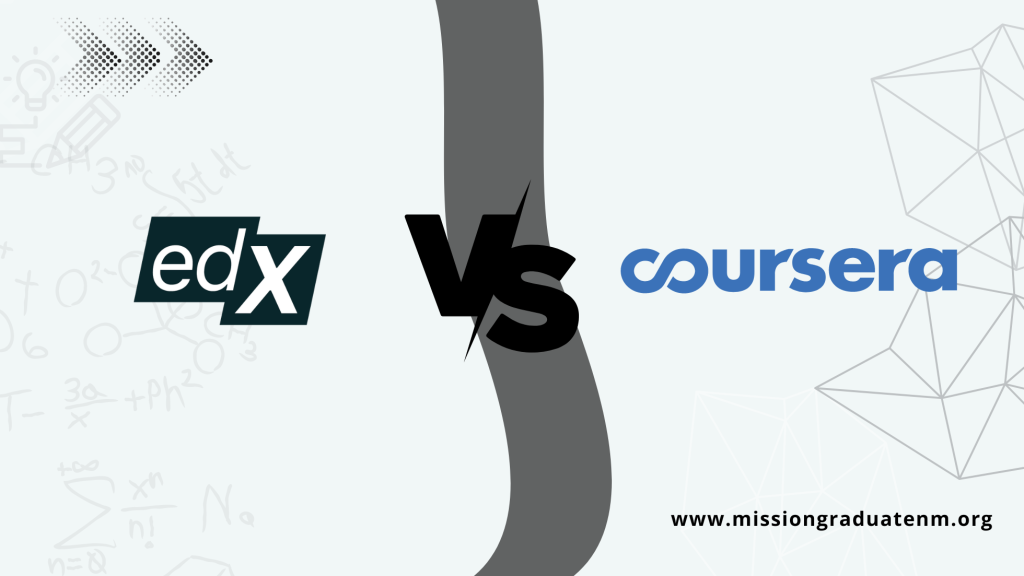Khan Academy is the best free learning platform for students seeking foundational knowledge in math, science, and core academic subjects without any cost barriers.
On the other hand, Coursera offers excellent value for professionals and learners who want industry-recognized certificates and advanced courses from top universities. This platform focuses on career advancement and skill development.
Both platforms serve different learning needs. Khan Academy targets K-12 education and basic skills, while Coursera emphasizes professional development.
This article covers their key differences, features, pricing, and much more. This will help you choose the right platform for your learning goals.
Key Differences Between Coursera And Khan Academy
Here’s a quick comparison table to help you understand the main differences between these popular learning platforms.
| Feature | Coursera | Khan Academy |
|---|---|---|
| Cost | $49/month for Coursera Plus | Completely free |
| Target Audience | Professionals, career advancement | K-12 students, basic learners |
| Certificates | Yes, accredited certificates | No certificates |
| Course Level | Beginner to advanced | Beginner to intermediate |
| University Partners | 350+ top universities (Stanford, Yale, Google) | None |
| Free Trial | 7 days | No trial needed (all free) |
| Offline Access | Available with a mobile app | Available with a mobile app |
| Best For | Career growth, professional skills | School subjects, foundational learning |
The choice between these platforms depends on your learning goals and budget. Coursera offers better value for career advancement and professional skills.
For students and budget-conscious learners, Khan Academy is a strong alternative to Coursera, providing quality education at no cost.
Coursera vs Khan Academy: Key Features
Coursera partners with leading institutions to deliver high-quality education and professional development. On the other hand, Khan Academy provides no-cost education for K-12 students.
Coursera Key Features
Coursera offers courses, certificates, and full degree programs across various fields, including business, technology, data science, and health.
- Partners with 350+ universities and companies like Stanford, Yale, Google, and IBM.
- Offers professional certificates recognized by employers
- Mobile app with a 4.7 rating on the Google Play Store.
- Serves over 135 million learners globally.
- It provides both individual courses and complete degree programs.
Khan Academy Key Features
Khan Academy focuses on providing free education to anyone, anywhere, primarily focusing on K-12 subjects.
- Completely free for all users.
- Covers math, science, humanities, and test preparation.
- Mobile app with a 4.2 rating on the Google Play Store.
- Used by over 120 million learners worldwide.
- No ads or subscription fees.
- Focuses on personalized learning paths.
Coursera Vs Khan Academy: Content And Categories
Both platforms offer different types of courses and content that serve specific learning needs and academic goals.
Coursera Course Categories
Coursera provides university-level courses across multiple disciplines. The platform covers professional and academic subjects for career development.
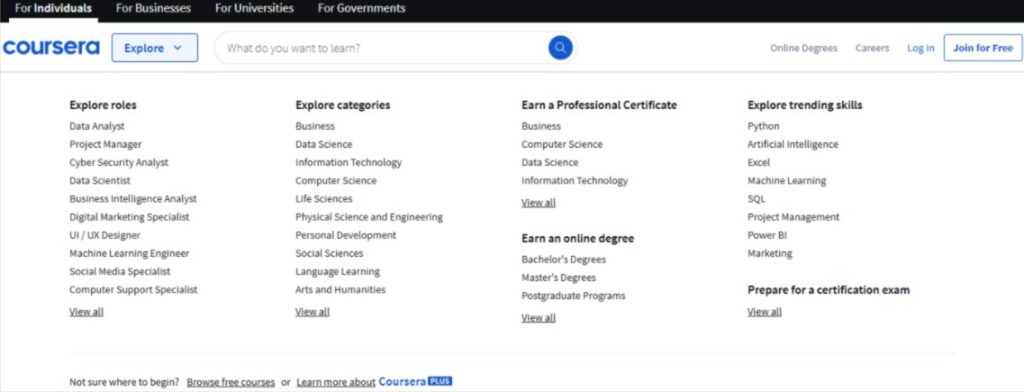
The popular courses include Machine Learning, Google Data Analytics, and IBM Data Science certificates.
- Business & Management (1,095 courses)
- Computer Science (668 courses)
- Data Science (425 courses)
- Health (471 courses)
- Social Sciences (401 courses)
- Arts & Humanities (338 courses)
- Physical Science & Engineering (413 courses)
- Language Learning (150 courses)
Khan Academy Course Categories
Khan Academy focuses on foundational academic subjects. The platform covers essential skills needed for academic success and test preparation.
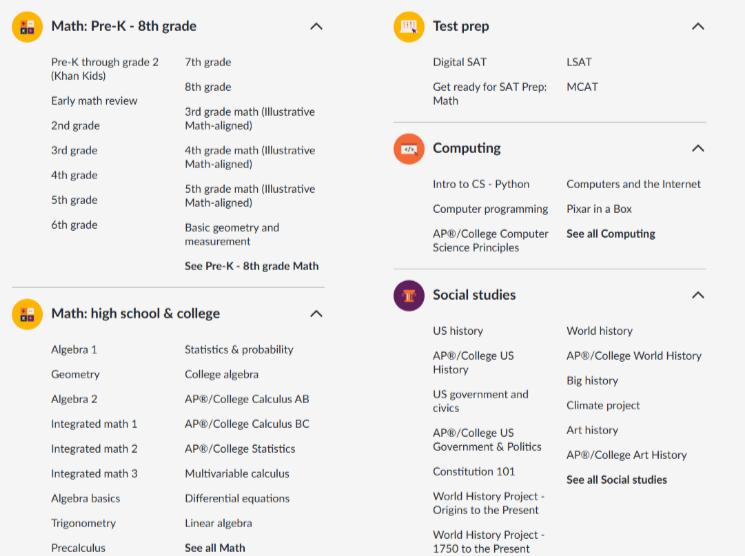
Khan Academy specializes in foundational subjects with step-by-step learning paths.
- Math (Pre-K through college level)
- Science (Biology, Chemistry, Physics)
- Reading & Language Arts
- Social Studies (History, Economics)
- Test Prep (SAT, LSAT, MCAT)
- Life Skills (Personal finance, College admissions)
Coursera Vs Khan Academy Pricing And Plans
Understanding the cost structure helps you make an informed decision about which platform fits your budget and learning requirements.
Coursera Pricing Plans
Coursera offers different pricing options, including single learning programs, monthly subscriptions, and annual plans. The platform also provides MasterTrack certificates and degree programs with varying price points.
| Coursera Plans | Price |
|---|---|
| Single Learning Program | $49 to $79/ month |
| Coursera Plus Monthly | $59/ month |
| Teams | $399/ Year |
| Enterprise | Contact Sales |
| Guided Projects | $9.99 |
| MasterTrack Certificates | Starting from $2,000 |
| Degrees | Starting from $9,000 |
Coursera pricing varies based on the type of program you choose. The Coursera Plus subscription gives unlimited access to thousands of courses and certificates. Individual courses cost between $49 – $79 per month, while guided projects start at $9.99.
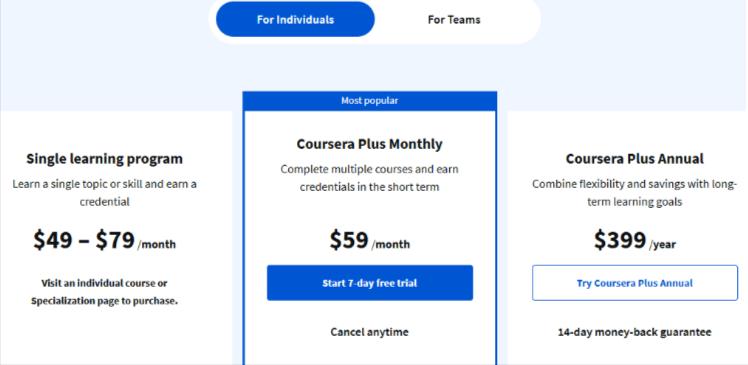
Degree programs and MasterTrack certificates require higher investments but offer formal credentials. The platform provides flexible payment options and financial aid for eligible learners.
Khan Academy Pricing Plans
Khan Academy operates as a nonprofit organization and provides free educational content for every user without subscription fees or hidden costs.
Coursera vs Khan Academy: Certificates and Accreditation
The certification options help learners choose platforms that align with their career goals and credential requirements. Coursera offers certificates on completion of courses, degrees, and specialized programs.
Coursera Certificates
Coursera offers multiple types of certificates that provide industry recognition and career advancement opportunities. Although Coursera is not an accredited institution, it partners with accredited universities and institutions to offer courses and degree programs.
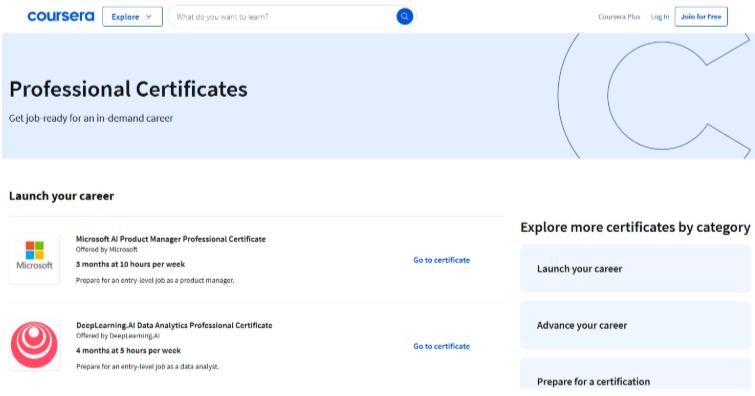
The platform provides Professional Certificates, such as Google Data Analytics, IBM Data Science, and Meta Social Media Marketing, that employers recognize globally.
University certificates come from institutions like Stanford, Yale, and Duke University. Specialization certificates require completing multiple related courses in areas like Machine Learning or Digital Marketing.
Full degree programs offer bachelor’s and master’s degrees with proper accreditation. Around 77% of Coursera learners report career improvements after earning certificates on the Coursera platform.
Khan Academy Certificates
Khan Academy does not offer any formal certificates or credentials upon course completion. The platform focuses on learning progress through detailed tracking systems and achievement badges for completed sections.
Students can monitor their mastery levels and see detailed analytics about their performance across different subjects.
Coursera Vs Khan Academy: Free Trial Offer
Coursera and Khan Academy handle free access differently, with varying trial periods and restrictions for new users.
Coursera Free Trial
Coursera provides a 7-day free trial exclusively for Coursera Plus new subscribers, giving access to over 10,000 courses and professional certificates.

The trial includes unlimited course access, certificate earning opportunities, and hands-on projects. After the trial period ends, you must subscribe to continue accessing premium content.
Individual courses and specializations do not offer free trials, but some provide limited free audit options. The platform also offers a 14-day money-back guarantee for subscriptions, allowing users to cancel and receive full refunds if unsatisfied.
Khan Academy Free Trial
Khan Academy does not offer free trials because all content remains completely free for every user without any subscription requirements or time limitations.
Khan Academy vs Coursera: Learning Experience
The learning experience differs significantly between these platforms, affecting how students engage with content and achieve their educational goals.
Khan Academy Learning Features
Khan Academy creates engaging learning experiences through interactive videos with visual explanations that make complex topics easy to understand.
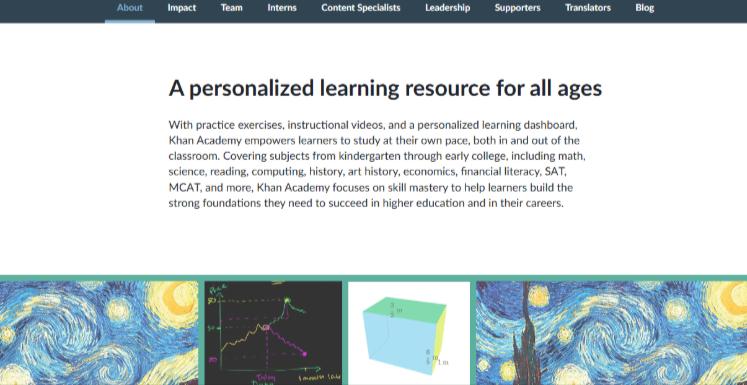
The platform provides immediate feedback on practice problems, helping students learn from mistakes quickly. AI-powered recommendations create personalized learning paths based on individual progress and knowledge gaps.
Detailed learning analytics show students exactly where they stand and what areas need improvement. The mastery learning approach ensures students fully understand concepts before advancing to new topics.
Coursera Learning Features
Coursera delivers high-quality video lectures from university professors and industry experts who bring real-world experience to their teaching. Graded assignments and projects provide hands-on learning opportunities that mirror professional work environments.
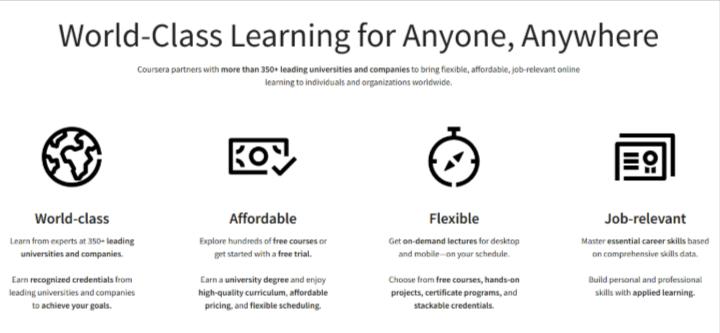
Peer review systems allow students to evaluate each other’s work and receive diverse feedback. Discussion forums create community support where learners can ask questions and share insights.
The mobile app enables course downloads for offline viewing, making learning possible anywhere. Flexible deadlines help working professionals balance education with their busy schedules.
Coursera Vs Khan Academy: Pros and Cons
Evaluating the advantages and disadvantages of Coursera and Khan Academy helps learners make informed decisions based on their specific needs and circumstances.
Coursera Pros
Here are the main advantages that make Coursera attractive for professional learners and career-focused individuals:
- A wide variety of courses from top institutions and companies.
- Industry-recognized certificates.
- Professional career advancement opportunities.
- High-quality content and instructors.
- Mobile app for learning on the go.
- Full degree program options.
Coursera Cons
Consider these limitations before choosing Coursera as your primary learning platform:
- Expensive monthly subscription fees.
- Limited free content access.
- Some courses have strict deadlines.
- Quality varies between different courses.
- Degree programs are costly.
Khan Academy Pros
Khan Academy offers several advantages that make it ideal for students and budget-conscious learners:
- Completely free for all users.
- Excellent for foundational learning.
- No time pressure or deadlines.
- Interactive and engaging content.
- Great for K-12 students and teachers.
Khan Academy Cons
These limitations may affect certain types of learners and career goals:
- No certificates or credentials.
- Limited advanced or professional content.
- Focuses mainly on academic subjects.
- No peer interaction features.
- Cannot replace formal education credentials.
Which Is A Better Platform Between Coursera And Khan Academy?
Coursera and Khan Academy learning platforms serve different learning needs effectively. Quora user Chrisa Torain compares Khan Academy to YouTube for intelligent videos where you browse and choose topics freely.
Coursera partners with universities to offer formal courses with professors, syllabi, and deadlines. Khan Academy works better for self-paced foundational learning, while Coursera excels for professional development and career advancement. Your choice depends on learning goals, budget, and whether you need certificates or just knowledge acquisition.
Which Platform Helped Me Upskill Between Coursera And Khan Academy?
I took the Google Data Analytics Professional Certificate program for eight months on Coursera, which completely transformed my career prospects.
The hands-on projects and real-world case studies helped me land a data analyst position with a 40% salary increase. The structured learning path and industry recognition made the Coursera Plus monthly investment worthwhile.
Meanwhile, my younger brother used Khan Academy throughout high school for mathematics support. He struggled with algebra initially, but Khan Academy’s step-by-step explanations and practice problems helped him consistently improve his grades from C to A.
More Topics Like This:
Conclusion: Coursera Is Better Than Khan Academy If You Prefer Completion Certificates
Both platforms serve different purposes in the online learning space. Coursera excels at professional development and career advancement, while Khan Academy excels at foundational learning and academic support.
For most learners, the decision comes down to budget and goals. Coursera offers excellent value if you need professional credentials and can afford the subscription. Khan Academy is an outstanding choice if you want free, quality education without certificates.
But Coursera is better for advancing careers with professional certificates than Khan Academy. You can go to Khan Academy for free resources and to learn without a financial burden.
FAQs
Khan Academy remains unmatched for free foundational learning, though Coursera offers better professional development opportunities.
Employers and universities recognize Coursera certificates from accredited institutions like Stanford, Yale, and Google.
Khan Academy provides excellent free education that helps millions of students improve their academic performance.
Khan Academy is not an accredited school, and coursework does not count towards a diploma or degree program.
Coursera offers accredited bachelor’s and master’s degree programs from partner universities starting at $9,000.
